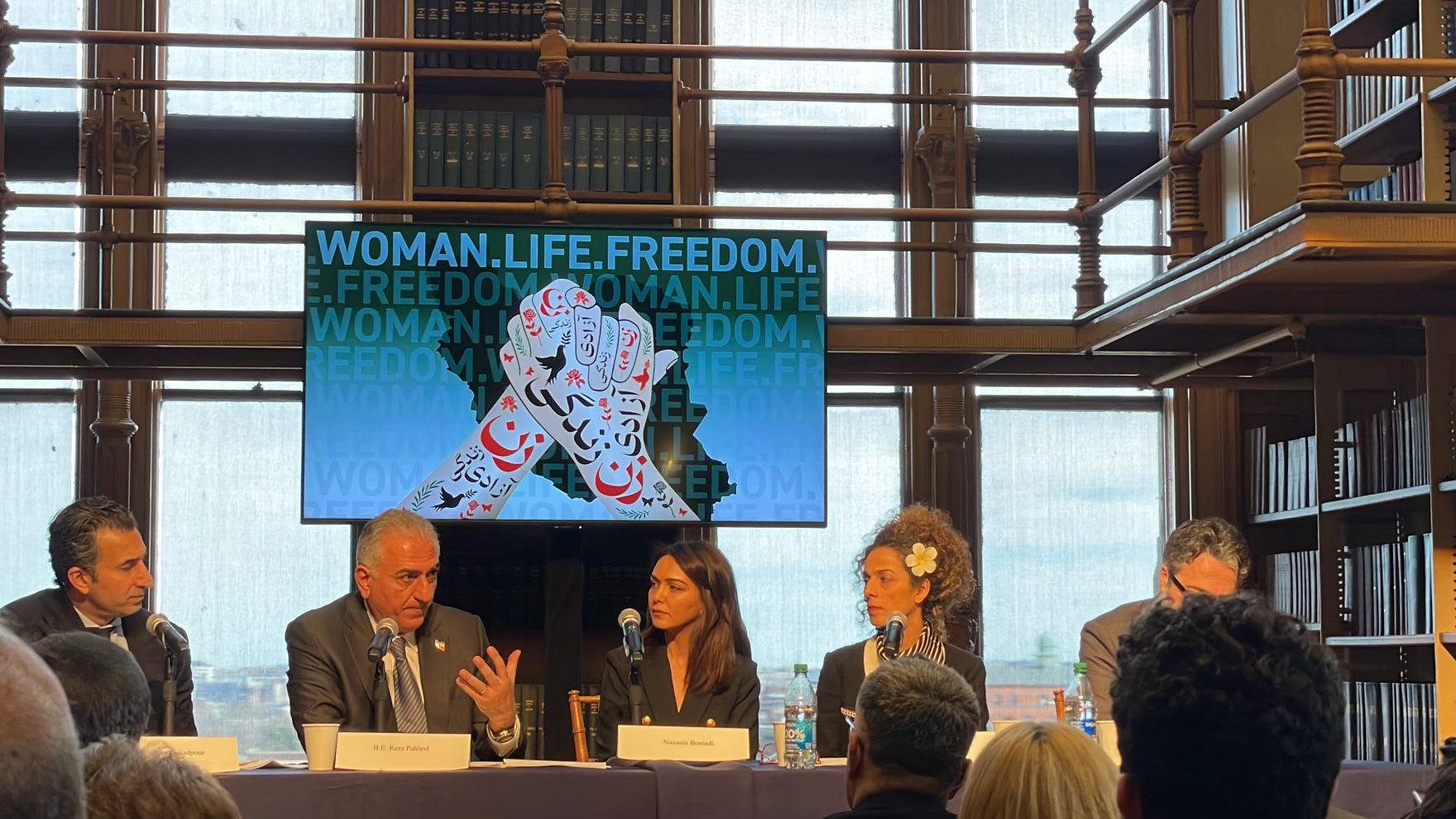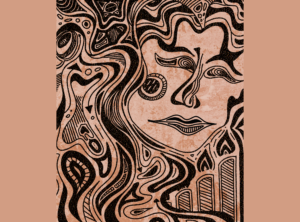Content warning: This article discusses police brutality and political violence.
On Feb. 10, the 44th anniversary of Iran’s Islamic Revolution in 1979, Iranian activists, journalists, and politicians gathered in Georgetown’s Riggs Library for an internationally broadcast press conference on the future of Iranian democracy. The panel marked a major moment in the ongoing revolution in Iran, as international activists vowed to prioritize a unified front above their plans for government structures in a future democratic Iran.
Georgetown’s Institute for Women, Peace, and Security ambassador Melanne Verveer hosted the event in collaboration with the SFS and the student-run Iranian Cultural Society. Panelists discussed the future of the ongoing Iranian revolution in person and over pre-recorded videos.
The in-person panel was primarily in Farsi and moderated by Georgetown professor Karim Sadjadpour. It included journalist Masih Alinejad, actress and human rights advocate Nazanin Boniadi, Crown Prince Reza Pahlavi, and Dr. Hamed Esmaeilion—president of the association of families of Flight P2752 victims who died in a 2020 plane crash. Nobel Peace Prize Laureate Dr. Shirin Ebadi, Secretary-General of the Kurdish Komala Party Abdullah Mohtadi, and actress and advocate Golshifteh Farahani spoke via pre-recorded messages, with Farahani also giving a statement on behalf of Ali Karimi, former captain of Iran’s national soccer team.
The ongoing protests began in September 2022, following the death of Mahsa Amini, a 22-year-old Kurdish-Iranian woman, in police custody. Amini had been apprehended by Iran’s Guidance Patrol—also known as the morality police—for allegedly wearing her hijab improperly. Hundreds of thousands in Iran and around the world have protested under the banner of “Zan, Zendigi, Azadi,” or, “Woman, Life, Freedom.” Amini’s death—and the deaths of other women, protesters, and activists—have sparked a new revolution in Iran to overthrow the current regime.
“The revolution was ignited by Mahsa’s murder,” Ebadi said in a video message. “It’s like a train that has left the station. A train that doesn’t intend to stop. And its last destination is the fall of the regime.”
The Islamic Republic’s regime, however, has cracked down on the protests. Since the movement began seven months ago, the regime has detained tens of thousands, executed at least four, and sentenced more to death“Dictator, say hello to the end,” Ebadi directed to the regime’s supreme leader, Ayatollah Ali Khamenei.
Alinejad, an author and women’s rights activist, emphasized that the nine featured leaders were representative of the many voices in Iran, who did not have the same freedom to speak. “We are working to produce a joint charter that includes the demands of the people,” she said.
Prince Reza Pahlavi, the exiled son of the former Shah, echoed calls for unity. “The time has come to consolidate our positions, put aside differences,” he said during the panel. “The time has come to put aside slogans, roll up our sleeves, and begin our work.”
Despite being a member of Iran’s former royal family overthrown over 44 years ago, Pahlavi has spent his career campaigning for secular democracy. Some protesters, recalling the time before the Islamic Republic’s regime, are in support of a re-established monarchy, with democratically elected representatives. A portion of Iranians see Reza Pahlavi as a potential future leader and modernizer of Iran, chanting “God Bless Your Soul Reza Shah” at protests.
Though Pahlavi has not campaigned for political leadership, over 450,000 people at the time of publication have signed a petition created by Iranian actor Ehsan Karami to make Pahlavi Iran’s representative in Iran’s shift to secular democracy. A recent Gamaan survey found that 39 percent of respondents identified Pahlavi as a future civil or political leader of Iran.
Other protesters reject the idea of the return of monarchy—or a son of the Pahlavi dynasty as a future leader. Protesters in Balochistan demonstrated with the slogans “No to Mullah and Shah, No IRGC Terrorists, Yes to Freedom” and “Death to the oppressor, whether he is the shah or the supreme leader.”
“We may not agree on every single thing. What is important is that we do not lose momentum,” Pahlavi added. “We are not a leadership council. We are going to help form such a council.”
“If there is one thing the Islamic Republic wants you to believe, it’s that we are so fragmented, we can’t even go to foreign leaders and ask for a single thing that’s achievable,” Boniadi, who has long criticized Iran’s inclusion in the UN’s Commission on the Status of Women, said.
Boniadi emphasized the success of Iran’s recent removal from the commission last December. She also spoke to the importance of symbolic successes and the role of international pressure against the current regime.
The future of Iran, as Alinejad pointed out, ultimately belongs to the young people and activists putting themselves at risk within Iran. “People inside the country are our inspiration and they are our hope,” she said.





